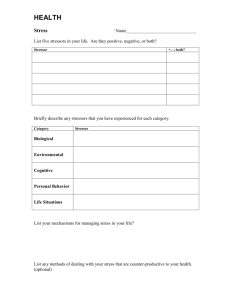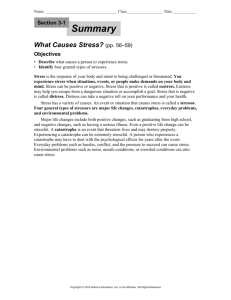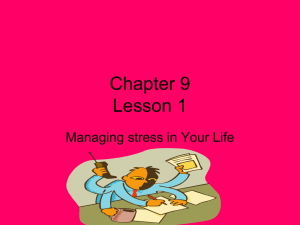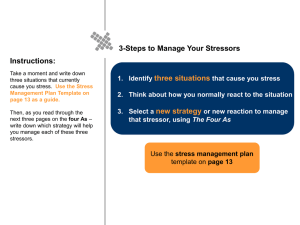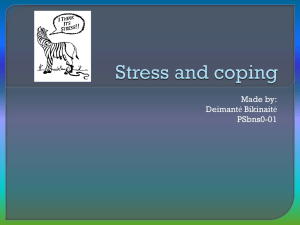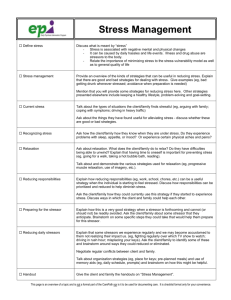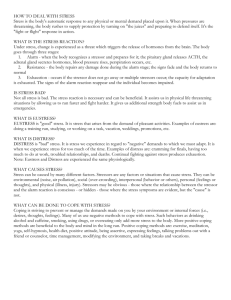Powerpoint
advertisement
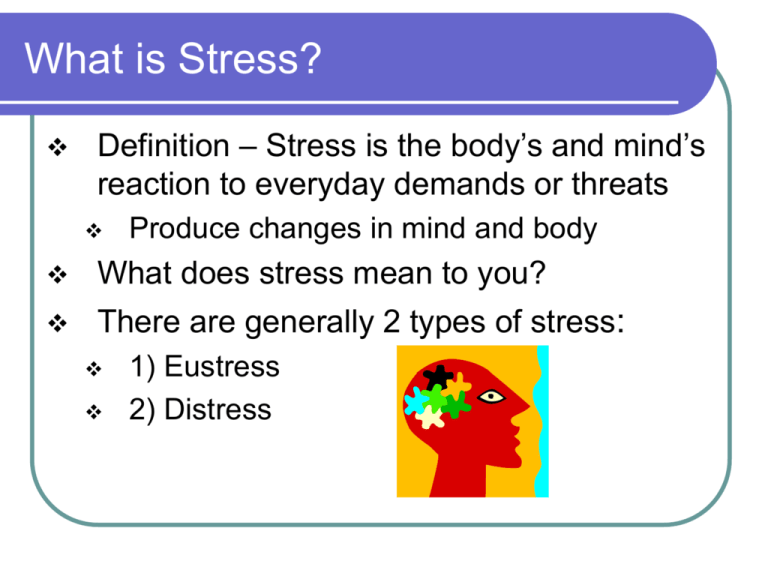
What is Stress? Definition – Stress is the body’s and mind’s reaction to everyday demands or threats Produce changes in mind and body What does stress mean to you? There are generally 2 types of stress: 1) Eustress 2) Distress Eustress Eustress is the “good” kind of stress Something pleasing will result at the end of the stressful situation Examples: Planning a wedding Planning a party Completing your last semester before graduating from high school Distress Distress is a displeasing kind of stress It is the “bad” kind of stress It causes the most harm to your body Examples: Death of a pet or a loved one You lost your wallet Financial problems Types of Stressors Stressors: can be internal or external trigger the stress response in your body generate stress can be either biological, environmental, cognitive, personal/behavioral or life situational Biological Stressors Biochemical imbalances Mental or physical illnesses Disabilities Injuries Environmental Stressors Hurricanes Poverty Pollution Crowding Natural Disasters Cognitive Stressors Inability to solve a problem Pressure to come up with a creative project Working on something you feel is unethical Have to do with the way you perceive a problem or what you expect from it Personal/Behavioral Stressors ‘Negative reactions’ from mind, body caused by: Using tobacco Using alcohol Not exercising Not eating properly Life Situations Stressors Breaking up with your boyfriend/girlfriend Having a pet or family member die Divorce Trouble among close friends Body’s Response to Stress Your body responds to stress is described by the term General Adaptation Syndrome It describes the body’s short-term and longterm reaction to stress It is a 3-stage response GAS - General Adaptation Syndrome Chart GAS: Stage 1: Alarm This is your immediate reaction to a stressor Starts a “fight or flight” response This prepares your body for physical activity Your body is weak during this stage and you are more likely to get sick GAS Stage 2: Resistance This stage is where your body adapts to stress, or the stressor you are exposing it to Your body balances and incorporates any changes to reduce the effect of the stressor Ex: You have not eaten all day Your body’s response is to decrease your desire for physical activity, conserving energy and maximizing nutrient absorption GAS Stage 3: Fatigue The stress has continued Body’s resistance to the stressor has reduced Long-term effect More susceptible to high blood pressure, heart attacks or severe infection Health Effects of Stress Short term and long term exposure to stressors in your life can lead to health problems Four categories of health effects: 1) 2) 3) 4) Physical Emotional Mental Behavioral Effects of Stress Physical Effects of Stress Some physical effects of stress include: Headaches Diarrhea Insomnia Upset stomach Tics/nervous twitches Back pain Ringing in ears Emotional Effects of Stress Some emotional effects of stress include: Frustration Nervousness Boredom Impatience Mood swings Low self-esteem Loneliness Mental Effects of Stress Some mental effects of stress include: Trouble thinking or reading clearly Lack of creativity Constant worry Obsessive thoughts Unable to make decisions Forgetfulness Losing sense of humor and perspective Behavioral Effects of Stress Some behavioral effects of stress include: Not eating/Overeating Compulsive talking Verbal/Physical Outbursts Using alcohol, caffeine and other drugs Smoking Gambling Driving too fast/other high-risk behaviors Managing Stress – Step 1 1) IDENTIFYING THE PROBLEM What is the problem? What is causing the stress? Source = Clear or Unclear The stress can even be a COMBINATION of stressors This makes finding the problem more difficult Managing Stress – Step 2 2a) Eliminate the stressor Change the way you react to the stressor Get a new perspective on the stressful situation – Learn from the stressor OR 2b) Engage in physical activity Releases ‘endorphins’ which help take your mind off the stressor Handling Stress – Physical Activity Get moving! Studies have shown that by increasing physical activity, you: Increase the flow of oxygen in your body Release endorphins Feel better! Reduce stress Handling Stress – Physical Activity Relax and laugh! "The art of medicine consists of keeping the patient amused while nature heals the disease” - Voltaire A good hearty laugh can: Reduce stress Lower Blood pressure MAKE YOU FEEL GOOD! Handling Stress – Re-channeling Energy Turn negative energy into positive actions and thoughts Clean the house Walking/Exercise Unable to put physical distance between you and the stressor? Take a mental break! Close your eyes and relax Listen to soothing music Handling Stress – Relaxation Techniques Abdominal breathing Yoga Meditation Massage Handling Stress – Yoga Handling Stress - Support Talk to individuals you trust Parents, teachers, coaches, siblings, close friends, clergy Support groups “Informal or formal gathering of people who meet and share experiences, feelings, and trust” Church youth groups, club meetings Handling Stress – Time Management Skills These are ways to plan and manage time in an effective, healthful way Set priorities Goals, tasks or activities that you feel are more important to do than others Decide which things to do in which order Can help you organize your day & reduce stress Handling Stress – Time Management Skills Write down your priorities Use calendars and day planners to help plan your days, weeks and months Set long and short-term goals to help you stay on task Ultimately reduce stress and guide you to success in life
